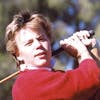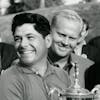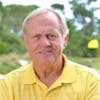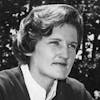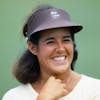Nanci Bowen - Part 2 (The 1995 Dinah Shore)
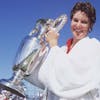
In the second part of our engaging conversation with Nanci Bowen, we delve deeper into her life and career beyond the greens. This episode offers an intimate look at Bowen's multifaceted journey post-professional golf and her contributions that extend far beyond her championship titles.
We begin with her recollections of her major championship win at the 1995 Dinah Shore as she shares a funny anecdote about JoAnne Carner's advice for playing the tee shot on the 18th at Mission Hills.
As we continue to explore Nanci's life story, she opens up about the complexities and challenges of navigating the LPGA Tour's executive committee. She shares the intricacies of tour scheduling, balancing television demands, avoiding clashes with men's tournaments, and the evolutionary changes in tournament logistics. Her insights provide a rare glimpse into the administrative side of professional golf, often unseen by fans.
Nanci candidly discusses her transition away from professional golf, revealing the personal struggles and identity shifts that accompanied her departure from the tour. Her journey took her through various roles, from working in golf shops to serving as an athletic director at Wesleyan College in Georgia. These experiences shaped her understanding of management, team dynamics, and the often-overlooked aspects of athletic administration.
In a striking revelation, Nanci delves into her passion for health and wellness, discussing her certifications in health coaching and sports psychology. She emphasizes the importance of mental strength and nutritional awareness, not only in golf but in everyday life, drawing connections to current practices on the tour.
The episode also highlights Nanci's philanthropic efforts, particularly her charity golf event in Tifton, Georgia, which supports hospice and oncology services. Her commitment to giving back to the community is a testament to her character and impact beyond the golf course.
Closing with our signature final questions, Nanci reflects on her career, offering poignant advice she wishes she had known earlier, a career Mulligan she'd take, and how she hopes to be remembered. Her responses are a blend of wisdom, humor, and sincerity, encapsulating the essence of a life well-lived and a career well-played.
Join us in this heartfelt and inspiring episode as Nanci Bowen shares the layers of her life that define her not just as a champion golfer,
Follow our show and/or leave a review/rating on:
Our Website https://www.forethegoodofthegame.com/reviews/new/
Apple Podcasts https://podcasts.apple.com/us/podcast/fore-the-good-of-the-game/id1562581853
Spotify Podcasts https://open.spotify.com/show/0XSuVGjwQg6bm78COkIhZO?si=b4c9d47ea8b24b2d
Google Podcasts https://podcasts.google.com/feed/aHR0cHM6Ly9mZWVkcy5idXp6c3Byb3V0LmNvbS8xNzM3Mjc1LnJzcw
About
"FORE the Good of the Game” is a golf podcast featuring interviews with World Golf Hall of Fame members, winners of major championships and other people of influence in and around the game of golf. Highlighting the positive aspects of the game, we aim to create and provide an engaging and timeless repository of content that listeners can enjoy now and forever. Co-hosted by PGA Tour star Bruce Devlin, our podcast focuses on telling their life stories, in their voices. Join Bruce and Mike Gonzalez “FORE the Good of the Game.”
Thanks so much for listening!
Music playing 00:00
Devlin, Bruce 00:15
Let's move into the 1995 Nabisco Dinah Shore Championship with rounds of 69-75-71-70, 3 under par and I know it was the biggest check you made, $127,500. That was nice.
Bowen, Nanci 00:37
It's a little bigger than the $8,000 I had won. You know, it was. It was a interesting week, started the week, you know, never played the course before. And ironically, a kind of a funny story we were playing in. I think it was Phoenix the week before. And there was a group of us on a little puddle jumper and flew into Palm Springs. And there were several players, including JoAnne Carner. She was on there. And I remember her they were, I was asking them about the course and they were telling me things about it. And JoAnne said, if you ever have the lead, you know the way she is, if you ever have lead at 18 on last day, aim at the palm trees on the right. I'm like, yeah, whatever. I didn't think much about that. So off I go.
Devlin, Bruce 01:30
She went a little far ahead of you then, right?
01:32
Yeah, I wish I could imitate her voice better. But it was to know her and how she said it, it was pretty funny. So I go out and I start playing the course and I was really struggling in the rough around the greens. I just didn't have that shot. So I called a really good friend of mine Ann Kane, who is a golf instructor down at the World Golf Village down there at their PGA Tour facility, and I said Anne I cannot hit this shot. So she went through she goes, Okay, she told me how to hit it. She said you just got to leave the club in the ground and just accelerate just leave the club in the ground. And I worked and worked and worked on that shot. And so she also sent me her yardage book when she went through Q school there. So I had her yardage book. I mean, I had everything. And I went into the week, going, Okay, I'm not the best ball striker, I'm not the best putter, I don't hit it he furthest I don't have the best short game, but the one thing I can do is have the best mental game here this week. And that was my goal. And so I went into the tournament, and every night, I wrote down how I was feeling. And, you know, did all my stats. And so, you know, the first round, you know, I played pretty well. And it was very, very windy, like straight in and cold too. So I was really lucky that, you know, it was like a two or three club wind all day. So I felt really good with what I had had done. So later that evening, I called a friend that I was having dinner with later in the week. And she and another friend, they one of them had a dream that I won the tournament. And I'm like, wow, you know, so all these little things are starting to come together. So anyway, I go through the next day and I'm just you know, I'm just trying to stay on the leaderboard. That is all I'm trying to do. Well actually, I'm sorry. I'm really I'm not leaderboard watching. I'm trying to make the cut. Even though I shot three under I mean, I'm just just get out there and play do your best mental game just, you know. Just see, make the cup make sure you stay on the leaderboard, whatever. And you know, come Sunday, you know, here I am. And I'm not watching the leaderboard. I know exactly where I stand, of course going into the day. But I teed off and just kind of did not watch the leaderboard. And I birdied I remember getting around to the back nine because I was playing pretty good, you know nothing special. But I birdied 15 and then made a great par save on 16 And I really didn't know like I said I wasn't watching the leaderboard but on 17 I made about a 20-25 footer for birdie and the crowd just went crazy. And I knew at that point because they didn't stop clapping and yelling, something's up. And then they take us in a cart ride to the next tee box. And the guy driving my cart said "well you're in the lead now" I'm like why did he tell me that? But I remember getting on the tee box and I hear JoAnne Carner's voice "if you ever had lead on 18 aim at the palm trees on the right. So sure enough, hit it to the right end. Mark Rolfing is commentating and I can hear him, "Oh, this is way right" I can remember that voice. And so then, you know I have a really tough punch out because I got to keep it under a limb over all the rough and not hit it too far either because there's water and I did not hit a good shot. I did get it out. And then my caddie never says a word to me. But he did. He said "You don't need to hit, I was gonna hit a longer iron. He goes, "let's just lay up and then just try to make par the hard way". And anyway, long story short, I did lay up hit it on the green and two putted for bogey, so it was a good bogey. So that's kind of how but yeah, those are some of the little things that I remember about that.
Mike Gonzalez 06:03
So, I was gonna I was waiting for you to to when you talked about your friend relating her dream to you? Yes, I was waiting for you to say. And by the way, you hit it way right on 18 in my dream.
06:17
Yeah, it was really fun. Well, it was it was just funny, because when I called them, they were like, so what did you shoot today? And I said, you know, I shot 69 And they're like, No way. They just couldn't believe it. Well, we had a dream that you won the tournament. So but yeah.
Devlin, Bruce 06:36
For our listeners, we might also just recall a little bit about that last round you started four back of Tammie Green and three back of Nancy Lopez and Laura Davies. So, you know, to come from behind those three players. Pretty fancy anyhow, they all shot over par that day, and you shot two under par 70 with a bogey on the last so that was a good comeback. Must have been a tough day.
Bowen, Nanci 07:08
Yeah, yeah. The conditions were, you know, I think it was a little breezy. I had played with Laura the day before. And you know, Laura hits that a mile. So, you know, I just, I didn't even think of winning the tournament, I was just trying to make a good check. You know, I try to do the best I could. And, you know, just, like I said on 17. I knew that they the crowd behind us wasn't clapping a lot. You know, there wasn't a lot of roars or anything. And so early on there were and then it just kind of there weren't but it wasn't really that focused on what was going on. So when I got to 17, and made that part and the crowd just went crazy. And usually, you know, they clap and whatever, and it's over, but they just, they just kept on and on and on. That's what I knew something's up. And then I found out so.
Mike Gonzalez 08:02
So did you take the proverbial dip into Poppie's pond?
08:06
I did. What was interesting was, it was the first year they had made the robe that they put on everybody. So that was the first year. So it is now over at the University of Georgia over they have a whole setup over there. So that's where it is. Which is actually across from Bubba Watson. I don't know if his master's jacket is they don't have a replica but the trophies over there. So we have a couple of majors and now Brian Harman. No, that's definitely he'll have something over there. But anyway, I did take the jump in the in the water. And so yeah, it was a it was a lot of fun. It was, you know, dinosaur had passed away by the time I want. But yes, Amy Alcott is the one that started that tradition with Dinah. And so that's, you know, you got to keep that tradition going.
Mike Gonzalez 09:01
I guess if you're going to pick one player to start to tradition like that. That's probably exactly.
09:09
Amy. Amy is a good one to start that. Exactly.
Mike Gonzalez 09:14
So just for the record. Our listeners can't see this. But our guest today Nanci Bowen is wearing a Georgia Bulldog shirt. Yeah, mentioning Brian Harman fellow Bulldog who in this year 2023 as we're recording this for those of you listening 50 years from now, he just won the Open Championship.
09:37
I thought about him while he was playing because nobody thought he would win, which was very much like me, nobody. I mean, I would be the last person on that leaderboard that anybody thought would win the tournament. So hang in there and keep working hard and things do happen.
Mike Gonzalez 09:52
He won it at Royal Liverpool, aka Hoylake. Let's come Back to the Nabisco Dinah Shore. Great history in that event, the first Colgate Dinah Shore was played in 1972. And this was when David Foster and Colgate Palmolive came on the scene to become a big, big sponsor of women's golf. And as we've talked to your peers and those that have come before you, Nanci, you all would agree that that was very transformative for ladies golf.
Devlin, Bruce 09:52
You never know.
10:31
Oh, without a doubt, I was the biggest tournament and to have those types of sponsors and they saved forever. You know, it wasn't like they were just in and out. They were there for a long time. And same with, you know, the Kraft Nabisco when they came on board, you know, they were there for a long time. And it it makes a big difference when you have a sponsor for a long period of time. And that actually what happened when Kraft came along, is that kind of for the program, all of the vendors and different people that they work with, come to the program and then they get together and they start their own tournament. So we have a lot of grocery stores, you know, like back when I was playing we had ShopRite, Safeway, Wegmans. Kroger. So, you know, as Ty Votaw used to say "everything's related to everything." So, it really spun off a lot of other tournaments.
Mike Gonzalez 11:31
Yeah, and women's golf, of course, the purses, probably in 1970 were paltry, probably under a million dollars. And by the time you got to 1980 prize money was $5 million. So it really, really did change the game. And David Foster and Dinah Shore were very instrumental in that. So great history. It's too bad that The Dinah Shore is no longer in that it left Mission Hills recently, went to Texas, I think the the new owners of that tournament will do a fine job, but it was your Masters wasn't it?
12:06
It was, you know, everybody asked, you know, you know, what was the Dinah Shore like, and I'm like, it's the equivalent of the Masters. And, you know, we both have the U.S. Open, now they have the British Open, both of us and the PGA and LPGA championships, but the Kraft and the Masters were definitely equals.
Mike Gonzalez 12:28
You know, as you look back at the history of the LPGA Tour, and I know this comes, this comes well, before you were on tour, but you go back to 1972. And I'm not sure I could find a more. I'll use the term again, transformative year for the tour in that not only did The Dinah Shore happen that year. And by the way, who won it? Jane Blalock, who we just visited, right, Jane with 27 wins the most wins of anybody without a major, the most wins of anybody who isn't in the World Golf Hall of Fame. And then it was Jane Blalock vs. LPGA in 1972, as well, and what came out of that in terms of really changing the governance model for how the LPGA Tour was run as a real business after that whole event.
Bowen, Nanci 13:19
Right, you know, it's interesting how when things happen, how it really contains the dynamics of how other things start to, to move forward. But, you know, with the, with a Dinah, being such a big tournament, and all the people that are involved in the tournament, and it's just amazing. I think that we've been able to move as far as we have from those days, when, you know, Jane was on the tour and all the controversy around her situation and where we are today, it's, you know, we're able to get through it and move forward. And, you know, it's, we're in a good place, and I think that, that that tournament is, is key. Yeah. Now, it has moved. Basically, you know, there's a lot of money behind it. So we have to be thankful for that, you know,
Mike Gonzalez 14:22
Well, the nice thing about winning a major championship, they can never take that away from you.
Bowen, Nanci 14:27
That's right. That's absolutely right.
Mike Gonzalez 14:30
How did that change life for Nanci Bowen?
14:35
Well, you know, I think people looked at me a lot differently as far as you know, being able to, to win at that level, and it's a confidence booster for sure, but I really tried hard to stay the same person that I was I was really concerned about that. I was actually really concerned that we had like a two week break And the next tournament we were playing was over in the Pinehurst area. And I was really concerned that it was going to be, you know, flash in the pan that I was, you know, although I never won again, I was really afraid that, you know, maybe I wouldn't go play well ever again, he kind of have this demons. And that next week played and finished, I think tied for third. So, you know that, you know, on top of the wind really solidified my, my staying power. And then I felt like I was going to be able to continue playing good golf and you know, it can it can mess with you if you if you let it.
Mike Gonzalez 15:41
So it wasn't a win. But it was your validation, wasn't it? Absolutely, absolutely.
15:45
That I wasn't a flash in the pan. Although, you know, I never won again, I also had, you know, two runner ups in 1997. So, you know, I was still, you know, able to continue playing well, it just, you know, wasn't able to capitalize on a win, but, you know, still had success after afterwards.
Mike Gonzalez 16:09
So, share with us some of your more fun moments out on tour. You know, when we, when we talked briefly yesterday, I shared how many stories we've heard just from the Japanese bus rides.
16:23
Right, you know, so it was a lot of fun. It was a there was a lot of good stories, you know, a lot of them that I've heard, you know, things that you don't think about, like when I was first play and the LPGA Championship I was I remember sitting in the Players Lounge with Sherri Steinhauer and we were just talking about the day and who we were paired with. And I was paired with JoAnne Carner. And she's like, Have you ever played with her before? And I'm like, No, I've never played with her before. She has let me just give you a few tips. Because he goes, Well, if she's ever, she likes to stalk her putts. And if you ever watch any film of her she does, he kind of stalks it and looks at it from every angle. She's like, when she's doing that. Just freeze. Don't read your putt, just stay right where you are. Because she she doesn't like it. She likes to be on stage. And so I'm like, okay, so I just remember and sure enough, she started her class and I didn't move. I was terrified. There's I mean JoAnne always has a lot of good stories. I think the same. Sherry told me another funny story that she JoAnne overslept, and was coming out to the course. And in in a rush, she put her shorts on backwards. They weren't, you know, buttoned up, they just pull on and so the rest of the day she her pockets, were kind of behind her.
Mike Gonzalez 17:54
Today, that would be all over YouTube and Twitter.
17:57
Absolutely, we're we're thankful that there was no social media when we were playing it. But yeah, we it was, you know, we had, we had a lot of fun out there. It is a I think it was more like a sorority in a sense. I always called it a traveling High School, everybody, you know, we traveled together not, you know, always on the same flights and things but, you know, it's it's like a circus out there with all the luggage that we all have and trying to get from place to place. And, you know, there's always things going on and caddie stories. And, you know, one good story, I think, a player. She had a caddy. And the next day, he shows up and he's a little bit late. And she's looking at him and she's like, Oh, I think that's my caddy. I'm not really sure. And finally, after a while on the range, they're getting ready to tee off. he hands her a note. And the note is from her real caddy. This is her, his twin brother is going to caddy for because he wouldn't feel it well. So there's, there's things like that are happening just constantly out there. That it's just a lot of fun to have the friendships that we all had and experience the things that we experienced together out there.
Devlin, Bruce 19:22
So Nanci, as a winner of The Dinah Shore, you got to go to Japan, correct? Yes, yes. So I have a question for you.
Bowen, Nanci 19:33
Okay.
Devlin, Bruce 19:34
Were you ever in the front bus or the rear bus?
19:40
Well, I'll tell you a funny story. I think it was Val Skinner was kind of, we had a great group of people Beth Daniel, Meg Mallon, Jane Geddes, Liselotte Neumann and then there's a bunch of us that were rookies Alison Nicolas, Juli Pierce, Let's see, I can't even remember everybody. But what happened was I told us that we had to perform in a talent show, a group and sing. And so, you know, and people were just so funny. I mean, I remember Juli Pierce just saying, I don't know if we have time to play golf. We've got to work on our song. But that we did, we had to perform over there. I want to say we were playing like crocodile rock or something crazy, like that. And then they made us when we played in Nashville, the whole group, there was like six of us that were rookies on that Japan tour. We weren't rookies but we were just rookies over in Japan. And it was just a great group of people. And, you know, they just, they made it fun. And we ended up having to perform at a Pro-Am party in Nashville, with Amy Grant and Vince Gill watching. So you know, there was a lot of a lot of fun times that we had together that you just don't, you don't have unless you did those kinds of trips. And, and we were, we were way down. The Japanese team already had their champagne iced down in the locker room, and we came out and beat them in singles. Because it was a team tournament. And so there was a lot of fun, you know?
Mike Gonzalez 21:28
For whatever reason, most of our guests Bruce, were on the booze bus, weren't they?
Bowen, Nanci 21:36
Yeah, I don't know what happened to their champagne. Maybe we ended up with it.
Mike Gonzalez 21:39
Well, one of the one of our favorite stories, probably Amy Alcott told it, but it was. So it might have been little bit before your time. But, Amy was on the booze bus, the party bus. Along with lot of others, including Kathy Whitworth and, there was a karaoke contest. And Kathy Whitworth, of course was the one that was left without a partner. So she partnered up with with Amy Alcott, who as you probably know, she was maybe the worst singer on
Devlin, Bruce 22:16
At least that's the consensus of the other ladies.
Bowen, Nanci 22:19
I can't confirm or deny, right?
Devlin, Bruce 22:22
You're not going to say a word right?
Mike Gonzalez 22:24
Their choulce of music and I kind of reflected on this. I don't know where I was, I was sitting on this. It just sort of dawned on me that this past year we lose Tina Turner, and Kathy Whitworth, two of the greats. Will do you know what they sang in the karaoke contest as partners?
Bowen, Nanci 22:42
What was that?
Mike Gonzalez 22:43
What's Love Got to Do with It?
Bowen, Nanci 22:44
Oh, my gosh, wow,
Mike Gonzalez 22:45
Tina Turner.
Bowen, Nanci 22:46
How about that, right?
Mike Gonzalez 22:48
That just kind of hit me like a ton of bricks.
22:51
I'm telling you. Well, the karaoke over in Japan is a big deal. The Japanese really liked karaoke, too. So that's kind of probably what spurred that on. Japan is a is a lot of fun. It's a good, good time.
Mike Gonzalez 23:07
So back, back in, in competitive play. As you were on the driving range, or the practice tee as they call it these days. Who might you stop and watch?
23:28
That's a good question. I'd say yeah, I enjoyed watching Meg Mallon swing. Meg Mallon had great tempo. And whenever I was paired with her, it was almost you felt like you were cheating because to be able to watch her swing. You felt like you could swing with that. She just had a great transition. And her swing, which I think we all strive for. You always hear that, you know, people that were the quick transition into pitting it all over the place. And she just had a great golf swing as Donna Andrews, who actually wanted the dinosaur the year before I did. We were the same age. She played at North Carolina while I was at Georgia. She another one that has a beautiful golf swing that I used to enjoy watching. There's a lot of there's a lot of good. I mean, Karrie Webb, great ball striker. There's just so many. There's some that you know, I wouldn't watch. I mean, even Annika, it was hard for me to watch Annika because of the way she moves her head out. If I did that I would come up and out of my shots. I couldn't watch Annika. But I mean, she's such a great player. And I was paired with her several times, but that's just that helps her and if I did that same thing. It wouldn't help me so I knew what to watch for what not to but you know, she's obviously one of the greatest players out there. But so yeah, there's some there's some good with a Beth Daniel great golf swing. She's just so tall. I can't really I can't generate that power. But there's there's so many good players. I think Lorena Ochoa, I watched her one time hitting wedge shots. And it's almost like she was landing balls on top of each other. It was really incredible. Her, her, me, it's just like one after the other is amazing. There's a lot of other good players.
Mike Gonzalez 25:24
So take us sort of bridge the gap from the time you won your major to the time you decided to, it was time to do something else.
25:33
Well as playing a lot of stuff, a lot of my friends were starting to retire that traveled with me became where it wasn't as much fun anymore. I didn't feel like I was as competitive. I remember telling my parents one time, I said, thinking about retiring. And I remember my mom saying, Yeah, I think your best days are behind you. Maybe that's an indicator, I should quit. But I just wasn't having fun. And I didn't feel competitive. And I always said early on. I said if I if I wasn't successful, by the time I was 30, I was gonna do something else. And I won when I was 27. And then I said, You know what, I'm not having fun and didn't feel competitive, I was gonna stop playing. And that's what I did. So I think I was 37, 38 When I left, and I still had status to play. But I just know, what's the point when you just don't, your heart's not into it. It's not worth being out there. And it was hard. I mean, it's a grind. I don't think the people understand how hard the travel is. And of course, back then, like I said, You're doing all your arrangements, you know, you got to get your car from here to there, you got to do all these crazy things. And it takes its toll after a while.
Mike Gonzalez 26:46
I think I would have asked my mother, how long hae you been thinking that way?
Bowen, Nanci 26:53
Well, you know, I think she I think she saw the writing on the wall too. But you know that my dad didn't really have a whole lot to say, Yeah, but my mom was a little vocal about that. So that was kind of funny, but it was fine. It was it was it was the right time. So I had no regrets about it.
Devlin, Bruce 27:14
Nancy, during that time that you're talking about, I guess for three years, you were on the LPGA Tour players executive committee, that would be an interesting part of your career, too.
27:26
It was I was always looking for something else to do. And so when I was voted in, it was, you know, I learned a lot about how the tour operates. It still is crazy how the schedule even comes together, once you start thinking about TV, and try not to be up against the men's tournaments. And there's so much involved in in certain tournaments, you know, they have their dates that they want, you don't want to be up against a man's, like, we never play up against the masters. I mean, who's gonna sponsor that tournament? Yeah. And you don't want to be up against the men's US Open or any of their majors. So that's, you know, so the scheduling is very difficult in certain courses. You know, they have their own stuff going on, too. They, they, they want to keep their tournaments that they have. So it, it's always, I always found the the, the scheduling to be quite a challenge to watch how it all comes together. And also, you know, there's always going to be players that are going to break the rules. And you know, that's always a challenge, too. And so we have to deal with that. And I remember we were this is an interesting one. When I was on the committee, the U.S. Open still, everybody went off a number one. And I don't know, Bruce, if when you were playing, I mean, you always teed off number one. So there's not a split t and we were arguing with the USGA that, Yup, got to split tees to get these rounds in because you've got 156 players, which is more than the 144 that we have every week. And we can't get everybody around. Number one this in the summer, you're probably going to have a thunderstorm. Good chance. Number two, if there's a ruling, you backed up the entire Golf Course. And so they Their argument was we want everybody to play the Golf Course the way it was laid out and how it's supposed to be played. And I'm like, Well, I'm sorry that whoever is tee off at seven, and the person teeing off at 2:30, or not seeing the same Golf Course. And finally, we got them to agree to split tea. So that was that was that was always been a thorn in my side, but the USGA is, you know, because they always know they hardly ever would finish, you know, getting everybody around before they made the cut. So that was I felt like we did a comp was up there as a as an executive committee.
Devlin, Bruce 30:03
Good.
Mike Gonzalez 30:04
Well that had to be an interesting stint being on that. Tell us about the transition, leaving the game of golf was it easy, difficult?
30:13
It was difficult. It's, it's still difficult today. Because I see your identity for so long. And I didn't really know what I wanted to do. Even today, sometimes I think about what do I really want to do. But it has given me an opportunity to do lots of different things. And you know, I've worked in golf shops have taught golf, I have been around golf a lot in that atmosphere. And then I had a chance to be an athletic director, which was definitely like being a fish out of water. But I had an opportunity. I was a athletic director for a short period of time, at a women's college in Macon, Georgia called Wesleyan. And it was one of the first colleges that would grant degrees for women. So I went there. And what I found out, this is a division three school, which is really a challenge in itself, because there's no scholarships. But it was, you know, I learned that the academic world is not something that, you know, I'm used to being able to get things done and you just can't get anything done in that atmosphere. I mean, zero. And I was I was very frustrated. I even went and talked to the faculty, it's a true address them about how important women's sports were for, for young women, and for them to help me out. You know, like, I would always have apprentices at 6am. So they wouldn't miss class. But they wouldn't help me out when we had to travel. And they would miss class. I mean, it was a just went round and round. And I'm like, you know, this is not for me. Because I was just I felt like I could, I felt like a hamster on the wheel and I could never seem to get anything accomplished. But I learned a lot. I learned what I did want to do. I didn't want to manage people, that's for sure. But it was fun. I did meet some wonderful people and I met a good friend Jamie Kaplan, who was a professional tennis player and she now runs the Kevin Brown, Russell Henley Charity golf tournament in Macon and they raise like a million dollars every year for charities in Macon. So another Bulldog, Russell Henley.
Mike Gonzalez 32:26
You had another interesting venture and you think about the preparation, you had of course, Bruce Devlin went from Master Plumber, as a young man to podcaster. Right. But but you at least went from journalism major and you had a stint in podcasting, golf related called "All Things Golf", I think that's up the Bruce and I would be really curious to hear about.
32:50
Right, it was a lot of fun, a group contacted me to do it. And so I went out there and, you know, in, you know, had a lot of contacts and golf and a lot of different ones. I didn't want to just do the run of the mill. So, you know, I did a caddy I had a caddy on there. I did Nancy Lopez, I did Amy Alcott. I was able to get players that, you know, that were that had an interesting story to tell, like Nicole Jeray has narcolepsy. And I used to travel some with her on the mini tour. And so we talked about what that was like for her to, I mean, that's a horrible thing to feel like he could go to sleep at any second. So in the, in the drugs that she she had, you know, that was able to talk to different people in the sport. A tournament director, like I said, and also tournament official, one of our officials. So, you know, it was just, it was fun to reconnect with these people and just kind of give a different perspective on things, it was a it was a lot of work and a lot of preparation. But unfortunately, the guy that was kind of hidden all up, he was suffering for some illness and passed away. So we just it kind of drifted away after that. But it was fun. I learned a lot so
Mike Gonzalez 34:20
Well, you're, you're maybe the only guest out of 82 that we've had that really has an appreciation for what goes into doing these right?
Bowen, Nanci 34:28
It's a lot of work. Yes, it is You because You gotta do your research. You don't want to, you know, you want to ask interesting questions.
Mike Gonzalez 34:37
Yeah, well, I guess from Bruce and I's perspective. We just want to make sure we do you and your careers justice.
34:44
Well, I think from what I've heard from these other interviews that y'all have done that you are all doing a fantastic job. And I think that it's really kind of cool what y'all are doing.
Mike Gonzalez 34:56
Well tell us about what you're up to now because, we an interesting conversation about the certification you got back about six years ago and the sort of work that that's led to.
35:07
Right? Well, I decided, you know, began trying to figure out what I wanted to do. And I'm, I'm always interested in nutrition and health. As we get older, obviously, we're, we look more into that. So I decided to get a health coaching certification. And, you know, learned a lot about, you know, how that affects everybody, and how a lot of what happens is, you know, obviously, within your mind, I also got a certification under my sports psychologists in their golf psych program, that that kind of the two are combined, and even now, I've evolved to, you know, just a mental shift in the way we think and what we say to ourselves every day, so I've really enjoyed just that kind of, you know, part of my life, and just helping people get healthier, you know, even myself, you know, we all, we all have our downfalls and things that we like to indulge in, whether it's alcohol, or foods that probably are in our best interest. But you know, it's really fun to help people and see people thrive and feel good.
Mike Gonzalez 36:18
And you know, most players on the tour now avail themselves of people like yourself, who provide a holistic approach to wellness. It's mental, it's nutrition, it's physical health, and so forth. And I'm sure that Patty Sheehan would have benefited from your services had you been in practice in 1990, when she was melting down in the heat at Atlanta Athletic Club, in that U.S. Open against Betsy King.
Bowen, Nanci 36:47
Right, right. It's interesting, yes. Because, you know, it's definitely Nutrition has evolved over the years, and it continues to evolve as we learn more and more, but back then, you know, we had hydration, but now it's even better than it was back then. And we know more about the foods that we eat and how it affects our bodies in our performance, especially for athletes. And, and there's, you know, golf specific, you need something different than, you know, a tennis player would need. And so, you know, in that also goes into exercise golf specific exercises now, where, you know, back when we were in college, I think it was we were working out like football players would Yeah. So it's a lot different. The stretching, a lot more stretching now.
Mike Gonzalez 37:32
Yeah, I mean, as Patty shared that story with us. It was the 36-hole final, as you probably remember, right in the heat of Georgia, which even for a Georgian, it seemed hot, right?
37:41
Oh, yeah. I remember. Unfortunately, I missed the cut by one there. So but we had, you know, it was it was very hot. We had to, I think the weather delays is because of the 36 holes. But yeah, it was, it was a challenge. And it always is a challenge to play in the heat. There's, there's some players that really, really struggled in the heat, and some that thrived in it. And most of the time, I didn't have a problem with it just because I grew up in it. Today is a different story. I like it as much, but I'd much rather play in the heat in the cold any day of the week.
Mike Gonzalez 38:17
Yeah, well in that 1990 A lady's US Open. That was a 36 hole final in that heat. Patty Sheehan loses an 11 shot lead. And as she looks back on it, because thankfully, two years later, she won her first U.S. Open, but she looks back on it says, you know, I didn't know how to manage my body and my nutrition, my caloric intake, hydration, none of that we didn't know any of that stuff.
Bowen, Nanci 38:41
Exactly, exactly. Yeah. And now you don't see that. Now, this certainly not going to be because of nutrition. I don't think that people it's more of the voices in your head that keeps you from not playing well.
Devlin, Bruce 38:56
So Nanci, oh, you also you also have a charity golf event that carries your name.
39:05
Right, down in Tifton. It's the Nanci Bowen charity golf event. It raises money for hospice and oncology services. So a lot of people know that hospice, what hospice does at the end of life, but oncology services is the part that I really like is that we provide transportation for people that need to get to their chemo appointments, or radiation appointments. It all started with a guy that came in, it was really, really cold out and he had a very thin jacket on and so the nurses ended up buying him a jacket. And so we're like, Well, you know, we want to be able to raise funds so that those types of things don't happen. And so, matter of fact, I was there with my mother for an appointment and I saw a taxi drive up and I asked the nurse If that was paid for, and she said, yeah, so I saw I had an accident while I was with my mom there. So it's done some really good things in the community. And it's the biggest fundraiser for hospice. So we're we're really pleased at how we've done there. And it's a small town. So it's hard to raise money in a in a town that doesn't have a lot of industry or anything to pull from.
Mike Gonzalez 40:25
Well speaking, for a couple of cancer survivors, we appreciate your efforts.
Bowen, Nanci 40:32
You all are looking awfully good.
Mike Gonzalez 40:34
You look good too so, before we wrap up, Nanci, as you may know, we always ask our guests three final questions. And I always let my partner go first. You have the tee, Mr. Devlin.
Devlin, Bruce 40:51
So Nancy, with all your great experience of playing golf, if you were to have known what you know now, back when you started on the tour, what would you have done differently?
41:05
Gosh, you know my hindsight is 20/20. And we get so much wiser as we get older, but I would definitely, there would be a mindset shift in how I'd talk to myself and how I approached everything. It would just be a lot more positive all the way around.
Mike Gonzalez 41:25
We've heard a lot about self talks from our other guests.
Bowen, Nanci 41:29
Those voices in your head.
Mike Gonzalez 41:33
All right. We're gonna to give you one career Mulligan? Where do you take it?
41:39
It would be in Portland. At the Safeway Classic in 1999. I double bogeyed the last hole. It cost me about 50 grand. So if I could play that hole over again, I think I would take it there.
Mike Gonzalez 41:51
Bruce, that didn't take long did it?
Devlin, Bruce 41:55
So the last one. How would you like Nanci Bowen to be remembered?
42:00
Oh gosh, a kind generous person that loved life and had a good sense of humor and was always willing to help and give back.
Devlin, Bruce 42:12
That's a great answer. Nanci, let me just say, from my standpoint, it's been a pleasure to have you on the podcast today. We thank you for your time and all your insights into not only yourself, but your game of golf and where you are today.
42:31
Well, it's been my pleasure. And I'm really looking forward to hearing more interviews that y'all are doing I think what y'all are doing is so much fun. And I'm so glad that it's going to be in the USGA home forever, and people can look back and see it. So thank you for having me. It was my pleasure.
Mike Gonzalez 42:53
Thank you for listening to another episode of FORE the Good of the Game and please, wherever you listen to your podcast on Apple and Spotify if you like what you hear, please subscribe, spread the word and tell your friends. Until we tee it up again, FORE the Good of the Game, So long everybody.
Music playing 43:12
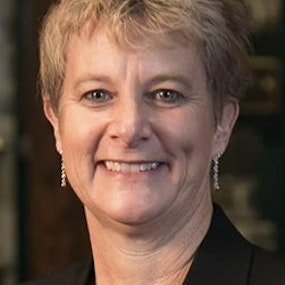
Bowen, Nanci
Golf Professional
Nanci Bowen of Travelers Rest, S.C., is a former touring player and major champion on the Ladies Professional Golf Association, and is currently teaching the game in Greenville, S.C. As a seasoned golf professional, she brings valuable experience and wisdom tothe students she teaches.
Born in Tifton, Ga., Bowen attended Tift County High School. As a junior golfer, she competed in many competitions administered by the Georgia State Golf Association, winning four consecutive Georgia Girls' Championships along the way. Now in its 37th year, Bowen won the second Girls' Championship played in 1981 at Coosa Country Club in Rome. She then added titles in 1982 (Country Club of Columbus), 1983 (Snapfinger Woods Country Club in Decatur) and 1984 (Houston Lake Country Club in Perry).
Bowen was awarded a full golf scholarship to the University of Georgia, where she was a two-time All-America selection, In 1987, Bowen earned individual runner-up honors at the Southeastern Conference (SEC) Championship, and in 1989, finished sixth at the NCAA Championship.
During her collegiate career as an amateur golfer, Bowen was a semifinalist at the 1987 U.S. Women's Amateur Championship played at Rhode Island Country Club in Barrington, Rhode Island. Also as an amateur, she qualified for and competed in four U.S. Women's Open Championships. She was the winner of the 1988 Trans-National Championship.
Bowen turned professional and joined the LPGA Tour in 1990. She captured her first professional victory at the Nabisco Dinah Shore in 1995, one o… Read More
New to FORE the Good of the Game?
Here are some great episodes to start with. Or, check out episodes by topic.
















